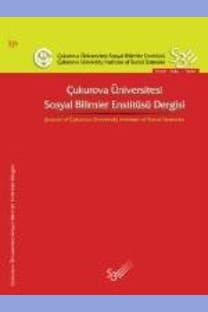A QUANTITATIVE STUDY ON TEACHER DECISION MAKING BEHAVIOR IN EFL CLASSES
xx
A QUANTITATIVE STUDY ON TEACHER DECISION MAKING BEHAVIOR IN EFL CLASSES
___
- Allwright, D., & Bailey, K. M. (1991). Focus on the language classroom: An introduction to classroom research for language teachers. Cambridge: Cambridge University Press.
- Artiles, A. J., Mostert, M P., & Tankersly, M. (1994). Assessing the link between teacher cognitions, teacher behaviors, and pupil responses to lessons. Teaching & Teacher Education, 10 (5), 465-481.
- Borko, H., & Shavelson, R. (1990) Teacher decision making. In B.F. Jones & L. Idol (Eds.), Dimension of thinking and cognitive instruction (pp.311-340). NJ: Lawrence Erlbam Associates, Publishers.
- Chamberlin, C. (1998). Research in second language teacher education [Review of the books Teacher cognition in language teaching: Beliefs, decision-making, and classroom practice & teacher learning in language teaching]. Tesol Quarterly, 32(3), 617-622.
- Fogarty, J. L.,Wang, M. C., & Creek, R. (1983). A descriptive study of experienced and novice teachers’ interactive instructional thoughts and actions. Journal of Educational Research, 77(1), 22-31.
- Freeman, D. (1989). Teacher training, development and decision making: A model of teaching and related strategies for language teacher Education. Tesol Quarterly, 23 (1), 27-43.
- Gaies, S. J. (1980). Classroom centered research: Some consumer guidelines. Paper presented at the Second Annual TESOL Summer Meeting, Albuquerque, N.M.
- Halkes, R., & Olson, J. (1984). Teacher thinking: A new perspective on persisting problems in education. Lisse, Netherlands: Swets and Zeitlinger.
- Johnson, K. E. (1992). Learning to teach: Instructional actions and decisions of preservice ESL teachers. Tesol Quarterly, 26 (3), 507-535.
- Johnson, K. E. (1999). Understanding language teaching: Reasoning in action. Boston: Heinle & Heinle.
- Nunan, D. (1996). Hidden voices: Insiders’ perspectives on classroom interaction. In K. M. Bailey & D. Nunan (Eds.), Voices from the language classroom (pp. 41-56). Cambridge: Cambridge University Press.
- Pratte, R. (1986). Educational policy and teacher educators. Australian Journal of Teacher Education, 11(2), 9-18.
- Shavelson, R. J. (1983). Review of research teachers’ pedagogical on judgements, plans, and decisions. The Elementary School Journal, 83(4), 393-413.
- Westerman, D. A. (1991). Expert and novice teacher decision making. Journal of Teacher Education, 42 (4), 292-305.
- Woods, D. (1991). Teachers’interpretations of second language teaching curricula. RELC Journal, 22, 1-18.
- Woods, D. (1996). Teacher cognition in language teaching: Beliefs, decision-making and classroom practice. Cambridge: Cambridge University Press.
- ISSN: 1304-8880
- Yayın Aralığı: 2
- Başlangıç: 2013
- Yayıncı: Çukurova Üniversitesi Sosyal Bilimler Enstitüsü Dergisi
Yrd. Doç. Dr. Pınar Süral ÖZER, Tayfun TOPALOĞLU
ÜNİVERSİTE ÖĞRENCİLERİNDE YALNIZLIĞIN YORDAYICISI OLARAK PSİKOLOJİK İYİ OLMA
Yrd. Doç. Dr. A. Rezan ÇEÇEN, Yrd. Doç. Dr. Fulya CENKSEVEN
Kurumsal Performans Değerlendirme Yöntemlerinin Gelişim Süreci:1850’lerden 2000’lere Bir inceleme
Dr. Mehmet Fatih GÜNER, Dr. Mehmet Ünsal MEMİŞ
GIDA SEKTÖRÜNDE HİZMET KALİTESİNİN ÖLÇÜLMESİ (ADANA KENTSEL ALANDA KEBAPÇI ÖRNEĞİ)
Prof. Dr. Serap ÇABUK, Yar. Doç. Dr. Hilal İNAN, Arş. Gör. Seval MUTLU
FİNANSAL RAPORLAMA AÇISINDAN DEĞERLEME
Tüketimin Çevreci Boyutu: Çevreci Tutum Ve Davranışlara Göre Pazar Bölümlemesi
TÜRK ŞİİRİNDE BİR GİZEM: ASAF HÂLET ÇELEBİ VE “HE” ŞİİRİNE BİR BAKIŞ
Z. Doğan KORELİ, Prof. Dr. V. Doğan GÜNAY
